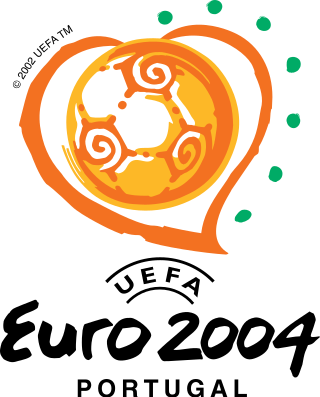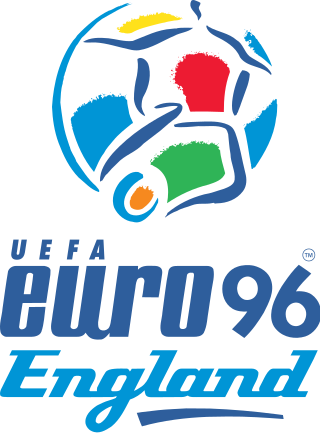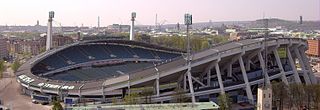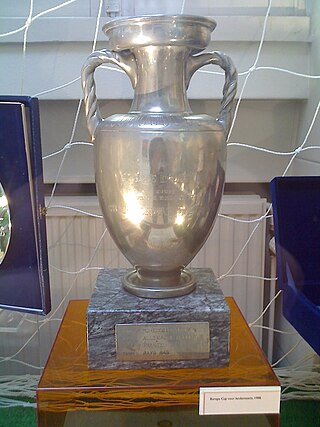Qualified teams
The top two placed teams from each of the two groups qualified for the knockout stage.
| Group | Winners | Runners-up |
|---|---|---|
| 1 | ||
| 2 |
The knockout stage of UEFA Euro 1992 was a single-elimination tournament involving the four teams that qualified from the group stage of the tournament. There were two rounds of matches: a semi-final stage leading to the final to decide the champions. The knockout stage began with the semi-finals on 21 June and ended with the final on 26 June 1992 at the Ullevi in Gothenburg. Denmark won the tournament with a 2–0 victory over Germany. [1]
All times Central European Summer Time (UTC+2)
Any game in the knockout stage that was undecided by the end of the regular 90 minutes was followed by thirty minutes of extra time (two 15-minute halves). If scores were still level after 30 minutes of extra time, there would be a penalty shootout (at least five penalties each, and more if necessary) to determine who progressed to the next round. As with every tournament since UEFA Euro 1984, there was no third place play-off.
The top two placed teams from each of the two groups qualified for the knockout stage.
| Group | Winners | Runners-up |
|---|---|---|
| 1 | ||
| 2 |
| Semi-finals | Final | |||||
| 22 June – Gothenburg | ||||||
| 2 (4) | ||||||
| 26 June – Gothenburg | ||||||
| 2 (5) | ||||||
| 2 | ||||||
| 21 June – Solna | ||||||
| 0 | ||||||
| 2 | ||||||
| 3 | ||||||
Sweden | Germany |
|  |
| ||||||||||||||||||||||||||||||||||||||||||||||||||||||||||||||||||||||||||||||||||||||||||||||||||||||||||||||||||
Linesmen: |
Netherlands | Denmark |
|  |
| |||||||||||||||||||||||||||||||||||||||||||||||||||||||||||||||||||||||||||||||||||||||||||||||||||||||||||||||||||||
Linesmen: |
Denmark | Germany |
|  |
| |||||||||||||||||||||||||||||||||||||||||||||||||||||||||||||||||||||||||||||||||||||||||||||||||||||||||||||||||
Linesmen: [3] |

The 2004 UEFA European Football Championship, commonly referred to as Euro 2004, was the 12th edition of the UEFA European Championship, a quadrennial football competition contested by the men's national teams of UEFA member associations. The final tournament was hosted for the first time in Portugal, from 12 June to 4 July 2004. A total of 31 matches were played in ten venues across eight cities – Aveiro, Braga, Coimbra, Guimarães, Faro/Loulé, Leiria, Lisbon, and Porto.

The 1996 UEFA European Football Championship, commonly referred to as Euro 96, was the 10th UEFA European Championship, a quadrennial football tournament contested by European nations and organised by UEFA. It took place in England from 8 to 30 June 1996. It was the first European Championship to feature 16 finalists, following UEFA's decision to expand the tournament from eight teams.

The 1992 UEFA European Football Championship was hosted by Sweden between 10 and 26 June 1992. It was the ninth UEFA European Championship, which is held every four years and supported by UEFA.

The 1988 UEFA European Football Championship final tournament was held in West Germany from 10 to 25 June 1988. It was the eighth UEFA European Championship, which is held every four years and supported by UEFA.

The 1984 UEFA European Football Championship final tournament was held in France from 12 to 27 June 1984. It was the seventh UEFA European Championship, a competition held every four years and endorsed by UEFA.
The knockout stage of UEFA Euro 2004 was a single-elimination tournament involving the eight teams that qualified from the group stage of the tournament. There were three rounds of matches, with each round eliminating half of the teams entering that round, culminating in the final to decide the champions. The knockout stage began with the quarter-finals on 24 June and ended with the final on 4 July 2004 at the Estádio da Luz in Lisbon. Greece won the tournament with a 1–0 victory over the host nation Portugal.
The knockout stage of UEFA Euro 2008 began with the quarter-finals on 19 June 2008, and was completed on 29 June 2008 with the final at Ernst-Happel-Stadion in Vienna.

The UEFA Euro 1992 final was the final match of Euro 1992, the ninth European Football Championship, UEFA's top football competition for national teams. The match was played at the Nya Ullevi in Gothenburg, Sweden, on 26 June 1992 and was contested by Denmark and Germany. Denmark qualified for the finals ten days before they commenced after Yugoslavia were ejected by UEFA as a result of the breakup of the country. They faced England, Sweden and France in the group stage before a penalty shoot-out victory over the Netherlands in the semi-final saw them progress to their first European Championship final. Germany were placed in UEFA Euro 1992 Group 2 where they played the Commonwealth of Independent States (CIS), Scotland and the Netherlands, before defeating Sweden in the semi-final.
Group 2 of UEFA Euro 1992 was one of the two groups in the final tournament's initial group stage. It began on 12 June and was completed on 18 June. The group consisted of the Netherlands, Scotland, Germany and the CIS, a team composed of players from 12 of the 15 former Soviet Union members.
The knockout stage of UEFA Euro 1996 was a single-elimination tournament involving the eight teams that qualified from the group stage of the tournament. There were three rounds of matches, with each round eliminating half of the teams, culminating in two teams playing in the final to determine the winners of the tournament. The knockout stage began with the quarter-finals on 22 June and ended with the final on 30 June 1996 at Wembley Stadium in London. Germany won the tournament with a 2–1 victory over the Czech Republic achieved by a golden goal during extra time.
The knockout stage of UEFA Euro 2000 started with the first quarter-final on 24 June and ended with the final on 2 July 2000.

The 2013 UEFA Women's Championship, commonly referred to as Women's Euro 2013, was the 11th European Championship for women's national football teams organised by UEFA. The final tournament, held in Sweden from 10 to 28 July 2013, became the most-watched in the history of the Women's Euros. It concluded with Germany, the defending champions, winning their sixth consecutive and eighth overall Women's Euro title after defeating Norway in the final.
The knockout stage of UEFA Euro 2012 began with the quarter-finals on 21 June 2012, and was completed on 1 July 2012 with the final at the Olympic Stadium in Kyiv, won by Spain. After the completion of the group stage on 19 June 2012, eight teams qualified for the quarter-finals, which were played from 21 to 24 June 2012. Host nations Poland and Ukraine failed to qualify for the quarter-finals, making it only the third time in European Championship history that the host nation(s) failed to make it out of the group stage; at Euro 2000, co-host Belgium were eliminated at the group stage, and at Euro 2008, co-hosts Austria and Switzerland also failed to qualify for the quarter-finals.
The knockout stage of the UEFA Women's Euro 2013 was a single-elimination style tournament contested by the eight teams advancing from the group stage of the competition. It began on 21 July 2013 with the quarter-final round, and concluded on 28 July 2013 with the final at the Friends Arena, Solna, to determine the champions.

The Netherlands national football team has appeared in ten UEFA European Championship tournaments, with an ongoing eleventh appearance in 2024. They first participated in 1976, and won the title in 1988. With Belgium, the Netherlands co-hosted the 2000 tournament. The team did not enter the first tournament in 1960, and did not qualify in 1964, 1968, 1972, 1984 and 2016.
The UEFA European Championship is the main football competition of the men's national football teams governed by UEFA. Held every four years since 1960, in the even-numbered year between FIFA World Cup tournaments, it was originally called the UEFA European Nations' Cup, changing to the current name in 1968.
The Denmark national football team have participated in ten UEFA European Championships, and won the tournament once. Their first tournament was the 1964 edition, in which they secured fourth place. In the final of UEFA Euro 1992 in Sweden, Denmark's 2–0 victory over Germany resulted in their first major tournament title.
The knockout stage of UEFA Euro 1988 was a single-elimination tournament involving the four teams that qualified from the group stage of the tournament. There were two rounds of matches: a semi-final stage leading to the final to decide the champions. The knockout stage began with the semi-finals on 21 June and ended with the final on 25 June 1988 at the Olympiastadion in Munich. The Netherlands won the tournament with a 2–0 victory over the Soviet Union.
The knockout stage of UEFA Euro 1980 was a single-elimination tournament involving the four teams that qualified from the group stage of the tournament. There were two matches: a third place play-off contested by the group runners-up, and the final to decide the champions, contested by the group winners. The knockout stage began with the third place play-off on 21 June and ended with the final on 22 June at the Stadio Olimpico in Rome. West Germany won the tournament with a 2–1 victory over Belgium.
The knockout stage of UEFA Euro 1984 was a single-elimination tournament involving the four teams that qualified from the group stage of the tournament. There were two rounds of matches: a semi-final stage leading to the final to decide the champions. The knockout stage began with the semi-finals on 23 June and ended with the final on 27 June at the Parc des Princes in Paris. France won the tournament with a 2–0 victory over Spain.